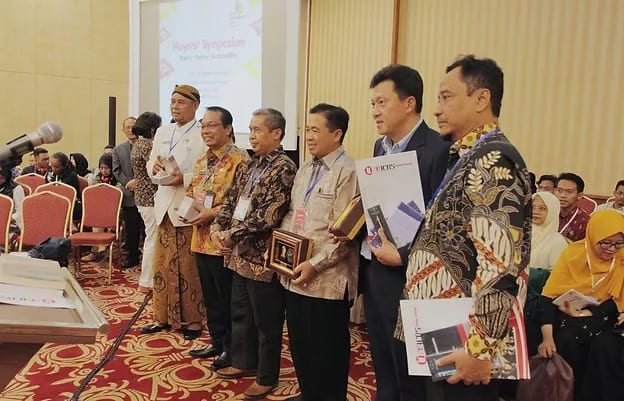
Civic Engagement 4.0: Dignity, justice, sustainability
WITH THE RISE of technological advancement, Indonesia has been facing a value crisis. Radicalism and intolerance manifest themselves in this phenomenon. Human dignity as the core of religious teachings has shifted into a shallow religious understanding. Religious education has become reductive and polarized the society. Meanwhile, falsehood and hate speech are being normalized on social media, cutting across every part of social life. These conditions endanger both social mindset and the national unity. To address these issues, we initiated a project on enhancing human dignity by reviewing religious education in Indonesia.
“Civic Engagement 4.0: Dignity-Justice-Sustainability” facilitated discussions for participants from different sectors to achieve dignity, justice, and sustainability in Southeast Asia in the era of urbanization and technological advancement. Justice and dignity need to be championed as core values in pursuit of sustainability. This is because sustainability cannot be achieved in economic terms alone; environmental, socio-cultural, and spiritual aspects are equally essential. In a sustainable society, everyone should enjoy life while being respected as humans.
This project began with “2019 International Forum in Solo”, Indonesia on August 20 to 23, 2019 which comprised of an opening ceremony, the Public Forum, the Mayors’ Symposium, an art exhibition, and thematic field visits. Around 250 participants were involved, including academics and students, NGO activists, government officials, and policymakers from Indonesia, Thailand, Japan, Australia, Canada, and the United States. This event was made possible through collaboration between ICRS, KotaKita (Solo), and Chulangkorn University (Thailand).

Over 50 percent of the world’s population live in urban spaces; this figure is expected to grow to more than 60 percent by 2030. The benefits and challenges of city life—poverty, inequality, climate-related disasters, and migration—are hyper-realized in urban areas. This must be confronted with innovative and practical solutions. Our project invited progressive city mayors from Indonesia, Malaysia, Thailand, the Philippines, and Cambodia to present their efforts in achieving a dignified, just, and sustainable society. At this event, participants from the civil society exchanged with the mayors directly to build upon common approaches and plan follow-up actions.
This event was part of our community service program series on “Co-Designing Sustainable, Just and Smart Urban Living through ICRS Education, Civic Engagement and Policy Advocacy”, a two year program (2019-2020) featuring a series of the following events: National Seminar (April 2019), Appropriate Innovative Product Competition (May 2019), an FGD with Teachers and High School Students (July 2019 and October 2019), Civic Engagement 4.0 International Forum (August 2019), Talk Radio (April and August 2019), Talk Shows at High School and Islamic Boarding School (November & Desember 2019), International Seminar and Public Campaign in Yogyakarta and Mataram (2020).
Overall, the goal of this program is to jointly design strategies and recommendations for government and public policymakers to produce policies that will shape just, intelligent and sustainable cities and communities. We intend to create academic papers, books, digital application training modules, and policy recommendations. To achieve this, we work together with high schools, universities, community organizations, faith communities, central and local governments, and policymakers.
Plans for 2020: Resolving religious intolerance
“Combatting intolerance, negative stereotyping and stigmatization of, and discrimination, incitement to violence, and violence against persons based on religion or belief.”
—United Nations Human Rights Council (UNHRC) Resolution 16/18
Recently, there has been a sharp rise of incidents of religious intolerance in Indonesia. This problem is evident in the cases where members of minority groups have been summoned by the police or taken court for religious blasphemy or defamation. In some, violence was used to intimidate groups that hold “different” beliefs from the mainstream religious groups. This problem suggests the urgency to empower the practice of interreligious harmony across Indonesia.
To address this problem as well as UNHRC Resolution 16/18, ICRS collaborating with the MRA, Ministry of Foreign Affairs (MFA), the Office of the Presidential Special Staff, Kalijaga Institute for Justice (KIJ) and other national and international partners will meet these challenges through the implementation of a three-year Program (2019-2022) entitled “Capacity Development Program on Inter-Religious Harmony: Dignity, Freedom and Rights”. Our goal is “to strengthen inter-religious harmony by developing the capacity of societal actors to help guarantee the upholding of dignity, freedom and rights in Indonesia”.
MRA has sponsored the proliferation of Forum Kerukunan Umat Beragama (FKUBs) (InterReligious Harmony Fora), which is spread in districts across Indonesia. Our activities will be focused on module development through FGDs and workshops, provincial-level training for members of FKUBs, training of trainers, policy discussion and advocacy, and action research.
With collective leadership and experts on the ground and their active participation in numerous national and international platforms, this program will reach its objectives with the aid of prospective partners:
Presidential Office • MRA (PKUB and R&D) • Ministry of Foreign Affairs (Public Diplomacy) • Kalijaga Institute for Justice (Ford Foundation) • Crisis Management Initiative (CMI), Finland • Embassy of Finland • Embassy of Denmark • Danish Special Envoy on Freedom of Religion or Belief • Embassy of the Kingdom of the Netherlands • Embassy of the European Union • EU Special Envoy on Freedom of Religion and Belief • UNTAR (Training and Resources) • PUSAD Universitas Paramadina

